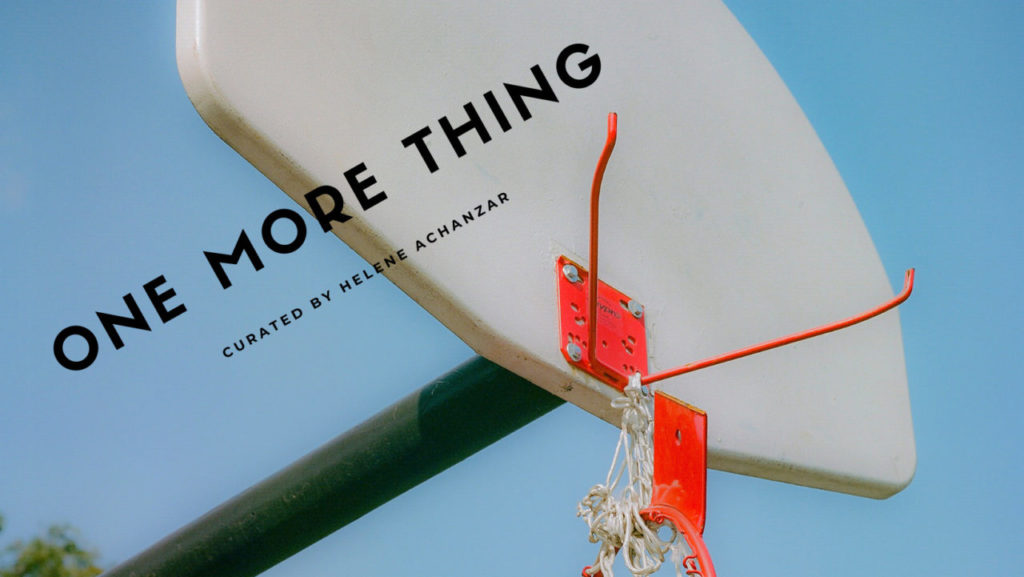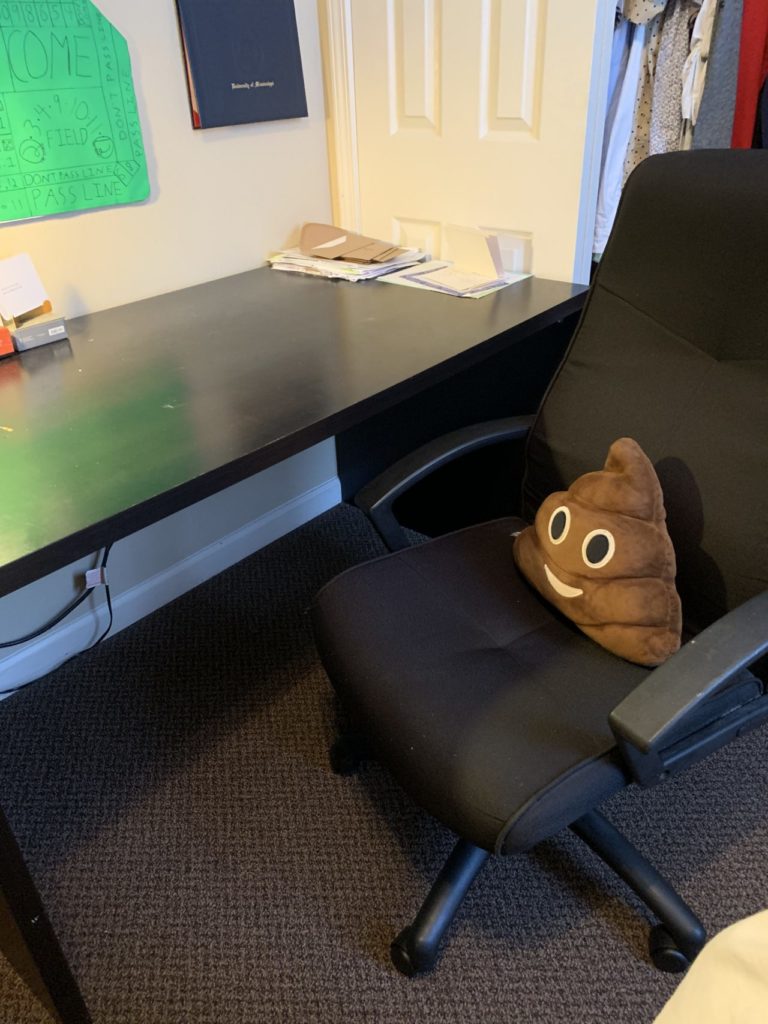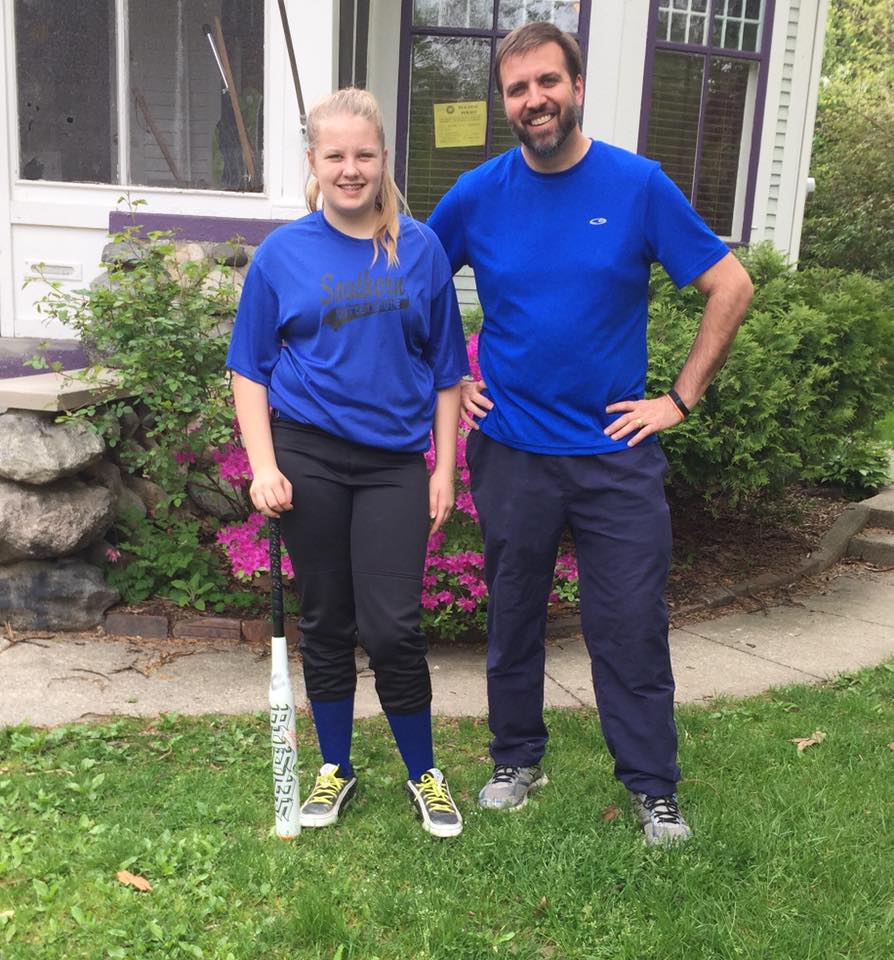One More Thing: Amorak Huey and Joshua Nguyen in Conversation
One More Thing is a series curated by Associate Editor Helene Achanzar featuring Poetry Northwest contributors and other writers in conversation. This installment features a conversation between recent contributors Amorak Huey, author most recently of Dad Jokes from Late in the Patriarchy (Sundress Publications, 2021), and Joshua Nguyen, the author of Come Clean (University of Wisconsin Press, 2021).
Joshua Nguyen: First off, I don’t know if Helene Achanzar had this psychic sense about it, but I feel incredibly lucky to have been chosen to read this book! As a dad-joke/pro-pun advocate, I was grateful to read all the humor that is embedded throughout your new book, Dad Jokes from Late in the Patriarchy.
In the first section of your book, “SETUPS,” you bring in various dad-type characters from various sitcoms (for example: Fred Flintstone, George Jetson, and Bob Saget), and I was wondering if you have thoughts on the parallels between writing poetry and joke-writing? Is there something that poets can learn from analyzing sitcoms or stand-up comedians?
Amorak Huey: Thanks for this conversation! I’m excited to get to talk with you about poems. I see your work around and always admire it, and I got your Bull City chapbook when it came out last year—it’s terrific.
I definitely think there’s plenty of overlap between humor writing and poetry writing. Structurally, both are so often about establishing and then subverting expectations, right? Dad Jokes from Late in the Patriarchy’s sections are modeled after the structure of a joke: setup, reinforcement, misdirection, punchline—which I thought became this useful metaphor for thinking about the structure of an entire life.
The best comedians, to my mind, are the ones who both use humor to get to more serious issues—and also use serious issues to get to the funny, the absurd. Tig Notaro, for example, or Hannah Gadsby. Richard Pryor, George Carlin, Eddie Izzard. They’re talking about real stuff, and sometimes it’s funny and sometimes you’re not sure you should be laughing, and poetry also so often lives in that same kind of in-between, uncomfortable space.
I want there to be room in poems for funny, and of course there is. David Kirby was one of my first poetry teachers, and his poems are often hilarious. Jamie Thomas, a classmate from my MFA program, taught me so much about how to fill a poem with wit. Patricia Lockwood, Matthew Olzmann, Kiki Petrosino—there are lots of poets whose poems are infused with humor. I see that at work in your poems, for sure—like, “After I Was Mistaken for the Stripper While Delivering Barbeque to an All-White Bachelorette Party”? I mean, it’s about racism and objectification, but also the situation is on its face absurd and funny, and your poem plays with that so well.
Joshua: Aww, appreciate the kudos! I love crafting surprises in poetry and subverting expectations—there’s so much power in a really good dropline!
I love that you cited Tig Notaro. She is actually my favorite comedian at the moment. I feel like at times in your book, you have the same pacing and delivery as Tig. I am thinking about your prose poems—for example, in “A Dog Barks, Someone Eats a Watermelon, a Car Drives Away,” you both have a way of casually engrossing the reader/audience into the scenario, and you both ask questions that can situate the story, like how in the poem you write, “What if every minivan on every avenue carries a different version of this story?”
I’m curious about your decision-making in choosing to write a poem in the prose-format (or to not write a prose poem) in this particular book, but you can also talk about your philosophy on prose poems broadly. I know every poet approaches it differently and I want to get insight into your approach. A second question: is the prose poem format better for humor?
Amorak: I love prose poems, both as a reader and as a writer. I also think they appear sort of seductively, deceptively easy to write on the surface; there are a lot of kinds of blah prose poems out there. Prose is our natural mode of writing and reading, right? Sentences and paragraphs are familiar, comfortable. And lineated verse has the built-in artifice of the line break. I think a primary project of poetry is to disrupt, to unsettle, and the line break certainly does that—literally interrupting the reader as the eye travels across the page, forcing a reset, a restart, a pause where one might not be expected.
A prose poem still needs to disrupt, but it has to do so without that particular device, so while it feels like choosing to write a poem without lineation is a way of letting go of the constraint of the line, it’s also taking on a new constraint: the challenge of interrupting the reader without the most obvious way of doing so. That puts a lot of pressure on the prose poem to have amazing, weird, interesting sentences. And content. That doesn’t mean a prose poem can’t appear simple or straightforward, but the best ones, I think, have something deeper in the language. The literary roots of the prose poem are connected to the surrealist tradition, and that makes sense to me: if the content is already surreal, perhaps the contrivance of line breaks is unnecessary—the poem is already strange enough.
I’m presenting this kind of lofty philosophical idea about the nature of the prose poem, right? I’m making no claims that my own prose poems live up to any of those. For me, I tend to turn to the prose poem when I’m bored with the line; when I feel weary or mistrustful of my own artifice. Writing in prose offers a kind of freedom but also a new thing to focus on: the sentence, the image, the idea, without the distraction of the line break. It’s a way to break my own patterns, challenge my practices—which I think we should always be doing as writers.
Joshua: Wow! Your philosophy on prose poetry is beautiful! I am flabbergasted over here. I’ve heard of people turning to lineated poetry when they are bored with the paragraph, but it makes sense that one can get bored of the lineated line. And I also love this idea of focusing on the image, or idea, of the poem without the distraction of the line break—it takes the pressure off of trying to make that amazing dropline work.
Shifting gears, I was delighted to see Dustin Parson’s blurb on the back of your book. I interact with him from time to time as we are both in the same English department here in Oxford, MS. When I first moved here, he really was like a literary dad to me—he built and brought over this writing desk and writing chair for me to have, and more recently, he brought me and my colleagues donuts when we were working on our community garden.
All this to say, I feel like in this work, and in Parson’s work as well, there is this inner interrogation of masculinity, and what it means to be a “dad.” In your poem, “Looking At Men,” where the speaker references memories of high-school aggression and men in pornography, you write that, “The world / teaches us to fear what desires us: a matter / of survival.” Is there a hope that readers of your book come across with a better understanding of masculinity, and if so, what would you hope that message to be?
Amorak: Dustin is great—his essays on fatherhood and masculinity have been super important to me. I think—hope—my work is at least somewhat in conversation with his ideas.
As for hoping readers come away from Dad Jokes with a richer understanding of masculinity and fatherhood, certainly yes, but I think I explore more than I prescribe, if that makes sense. Who am I to tell anyone anything, to make claims outside of my own experiences, my own body? I feel like anything I say here about my “message” is going to come across as super cheesy, but basically it’s: approach the world with gentleness. And be a human being first, right? Don’t be afraid to be vulnerable, don’t feel trapped by what you see on television as far as gender roles or sexuality. I don’t know—like, give people a writing desk if you can, bring them doughnuts, help with the cooking and cleaning. And as far as being a dad, a parent, dive into that with every part of your heart and body and don’t be afraid of how terrifying it is to love someone. Changing a diaper doesn’t make you less masculine.
Does this make sense? I might be babbling now. I hope my poems express all this in a more compelling way.
Joshua: I think it does make sense. Personally, after reading your book, I thought a lot about my own masculinity, and how my masculinity is shaped differently due to being Asian-American. I’ve been thinking a lot about this current trend of showing very hot masculine men on movies/TV, and though I do think it’s needed (because of the whole emasculation of Asian men), it can come off kind of cheesy and not nuanced. But because your poems didn’t come off cheesy or preachy, I could come to my own message (shaped by my own experiences) on my own. So thank you!
Changing subjects again (in a more lighthearted way), why do you think “dad” jokes get such a bad connotation? Is it the fact that the “dad” is attempting humor? Or is it something about the joke itself that makes it “dad”-like? And who decided what the dad-ness of jokes could or could not be?!
Amorak: I really had to think about this one. What I’ve come up with is that the traditional, patriarchal, American dad, as seen on TV, is kind of an outsider to the family’s emotional life. They are authority figure, disciplinarian, advice giver, but when it comes to emotional connection, their attempts are bumbling—sort of endearing, but inept. And so the “dad joke” becomes this awkward attempt at communication, at participation in the family discourse, and thus greeted with mild tolerance, groans, eye rolls. I mean, that’s how people respond to puns in general, right? So the “dadness” of the joke is the gap between the word play and real intimacy, and the response is a sort of “oh isn’t that cute, dad’s trying to bond with us.”
My thesis is kind of half-baked here, and maybe this didn’t end up as all that lighthearted. Of course, I love puns and word play, and my family’s always groaning and sighing at me for it. Except for my daughter, who shares my appreciation for the form. And I’m pretty sure I don’t use dad jokes as a substitute for authentic emotional connection with my kids. So, you know, I’m a stereotype but not *that* much of a stereotype.
Do you know how you measure the effectiveness of a pun? With a sighs-mograph.
Joshua: Thank you so much for your genius thesis on the dad-joke. I hope to see it in JSTOR shortly!
One more thing I would like to ask you before we say goodbye is what is something that has delighted you recently or something that made you laugh to yourself? I find that the laughter we give ourselves when no one else is around feels very vulnerable and self-nourishing.
Amorak: I’ll give you two answers: things recently that delighted me are watching my son play goalkeeper for his club team (he stopped a penalty last weekend) and driving to Chicago to bring my daughter home for the summer after her first year of college.
And then there’s this silly tweet that I came across the other day that makes me laugh every time I think about it:
“I’m worried the 10 great warriors I summoned from different periods of history to fight in a tournament have started a second group chat I’m not in”
Thanks for a great conversation!
—
Amorak Huey is author of four books of poems including Dad Jokes from Late in the Patriarchy (Sundress Publications, 2021). Co-author with W. Todd Kaneko of the textbook Poetry: A Writer’s Guide and Anthology (Bloomsbury, 2018) and the chapbook Slash/Slash (Diode, 2021), Huey teaches writing at Grand Valley State University in Michigan. His previous books are Boom Box (Sundress, 2019), Seducing the Asparagus Queen (Cloudbank, 2018), and Ha Ha Ha Thump (Sundress, 2015), as well as two chapbooks. He is recipient of a fellowship from the National Endowment for the Arts, and his poems appear in the Best American Poetry anthology, Academy of American Poets’ Poem-A-Day, the Norton Critical Edition of The Odyssey, and many print and online journals.
Joshua Nguyen is the author of Come Clean (University of Wisconsin Press), winner of the 2021 Felix Pollak Prize in Poetry and winner of the 2022 Mississippi Institute of Arts & Letters Poetry Award. He is also the author of the chapbook, American Lục Bát for My Mother (Bull City Press, 2021). He is a Vietnamese-American writer, a collegiate national poetry slam champion (CUPSI), and a native Houstonian. He has received fellowships from Kundiman, Tin House, Sundress Academy For The Arts, and the Vermont Studio Center. He has been published in Wildness, The Texas Review, Auburn Avenue, and elsewhere. He is the Wit Tea co-editor for The Offing Mag, the Kundiman South co-chair, a bubble tea connoisseur, and loves a good pun. He is a PhD student at The University of Mississippi, where he also received his MFA.



